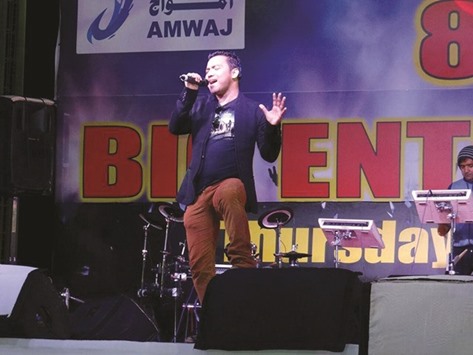Santosh Pariyar is a popular name among the Nepalese community. He first set up a musical band with six Nepalese friends in 2002. These days he is busy jamming up with three Bangladeshi buddies along with his other compatriots.
Pariyar and his band performs during programmes and festivals hosted by different communities.
Recently the band members were rehearsing Resham, a popular folk song by Nepalese Nepathya Band, which they were expected to perform in an upcoming event. Santosh was singing with full vigour, and accompanying him were Bangladeshi instrumentalists, Soyel, Rashid and Bappa.
Soyel finds Himalayan music soothing, and reiterates that music has no boundaries. “We don’t find difficult to play instruments on Nepalese music, language is not a barrier,” Soyel says, “We almost forget which country we are from when we work with Pariyar.”
Pariyar was working in Saudi Arabia before he came to Qatar. After some months of his arrival, he got a rare chance to perform during a programme organised by Non-Resident Nepalese Association (NRNA) in Doha. The song he performed that day was a folk song Goreto Ani Galli. That song was liked by the audience, and he was remembered thereafter by the same song.
He was excited by the response. Despite his long work schedule, he played the guitar and sang during his free time.
Financially, it was very difficult for him to set up a band. “I was like crazy, and I was addicted to music,” Santosh remembers his formative days, “so, against all odds, I was finally successful to form my dream project.” He found very hard to find friends who would support him in his band and who had the same energy levels he had.
Luckily, he was acquainted with keyboardist Nabaraj Rokka, guitarist Santosh Gurung of Shiva band and Suraj Pradhan, and percussionist Ganesh Lama. He sacrificed a month’s salary for the band. Others including philanthropist Sagar Nepal supported his band.
The name of the band was Sangharsha, which means ‘struggle’ in Nepalese. It was the best suited name for the band which went through a rough patch during its formation. “I used to sing from a very young age,” Santosh says, and my muse was my girlfriend. Santosh had come to Saudi Arabia to earn some money to get married with his high school sweetheart. He stayed in Saudi Arabia for three long years working in a goat farm. All of his friends returned home after finding the job daunting, but he stayed on to pursue his dream.
But in Saudi Arabia, there were hardly any avenues for Nepalese music. He performed in one programme organised in one company, located 80km west of Riyadh. The audience was small but every one of them was impressed by his performance.
Pariyar came to Qatar to participate in Singing Star Contest in 2002 and stayed thereafter. He quit his job in 2010 to participate in another contest held in Kathmandu. In the 2010 contest, he made it through top 20 among 14,000 participants. He is the first Nepali member of Panjab Music Group.
In 2012, he returned back to Qatar. By this time, the band was already disbanded, every band member was out of contact, and everybody had already forgotten the name of his band. He formed a new band with some Bangladeshi and Nepalese friends.
“We perform during programmes organised by Nepalese, Indian, Bangladeshi, and Pakistani communities.” Santosh recently released his debut album some months earlier in Kathmandu. His daughter also sings, and has supported him in his new album, and also performed in one live concert. Smilingly, he wishes his daughter would inherit his talents.

SING ON: Santosh Pariyar performing at an event recently.
